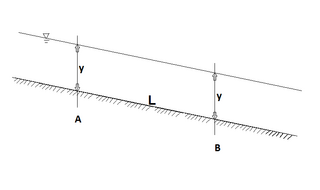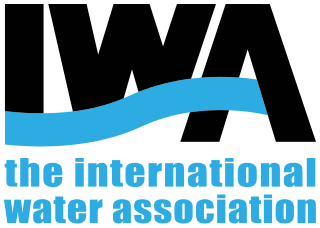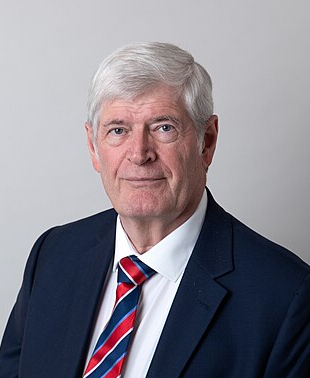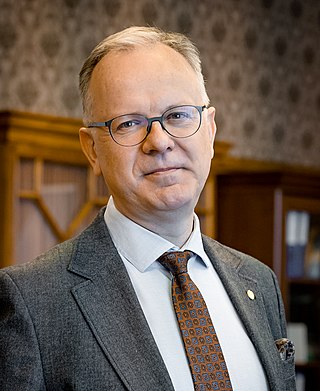Related Research Articles

Hydraulics is a technology and applied science using engineering, chemistry, and other sciences involving the mechanical properties and use of liquids. At a very basic level, hydraulics is the liquid counterpart of pneumatics, which concerns gases. Fluid mechanics provides the theoretical foundation for hydraulics, which focuses on applied engineering using the properties of fluids. In its fluid power applications, hydraulics is used for the generation, control, and transmission of power by the use of pressurized liquids. Hydraulic topics range through some parts of science and most of engineering modules, and they cover concepts such as pipe flow, dam design, fluidics, and fluid control circuitry. The principles of hydraulics are in use naturally in the human body within the vascular system and erectile tissue.

Hydraulic engineering as a sub-discipline of civil engineering is concerned with the flow and conveyance of fluids, principally water and sewage. One feature of these systems is the extensive use of gravity as the motive force to cause the movement of the fluids. This area of civil engineering is intimately related to the design of bridges, dams, channels, canals, and levees, and to both sanitary and environmental engineering.

A culvert is a structure that channels water past an obstacle or to a subterranean waterway. Typically embedded so as to be surrounded by soil, a culvert may be made from a pipe, reinforced concrete or other material. In the United Kingdom, the word can also be used for a longer artificially buried watercourse.
Hydroinformatics is a branch of informatics which concentrates on the application of information and communications technologies (ICTs) in addressing the increasingly serious problems of the equitable and efficient use of water for many different purposes. Growing out of the earlier discipline of computational hydraulics, the numerical simulation of water flows and related processes remains a mainstay of hydroinformatics, which encourages a focus not only on the technology but on its application in a social context.
Hunter Rouse was a hydraulician known for his research on the mechanics of fluid turbulence.

The International Water Association (IWA) is a self-governing nonprofit organization and knowledge hub for the water sector, connecting water professionals and companies to find solutions to the world's water challenges. It has permanent staff housed in its headquarters and global secretariat in central London, the United Kingdom, to support the activities, and has a regional office in Chennai, India. The aim of the IWA is to function as an international network for water experts and promote standards and optimal approaches in sustainable water management. Its membership is a global mosaic comprising 313 technology companies, water and wastewater utilities, 54 universities, and wider stakeholders in the fields of water services, infrastructure engineering and consulting as well as 7,791 individuals including scientists and researchers, with 53 governing members (2021). IWA is an affiliated member of the International Science Council (ISC). IWA features regional associations, approximately 50 specialist groups covering key topics in urban water management, specialized task forces, and web-based knowledge networks.
The International Association of Hydrological Sciences (IAHS) is a non-profit, non-governmental scientific organization committed to serving the science of hydrology and the worldwide community of hydrologists. The IAHS was established in 1922, and presently claims a membership in excess of 9,000 with members in over 150 countries.

Hubert Chanson is a professional engineer and academic in hydraulic engineering and environmental fluid mechanics. Since 1990 he has worked at the University of Queensland.

Theodor Christoph Heinrich Rehbock was a German hydraulics engineer, and professor at the University of Karlsruhe.

The Aldeadávila Dam is a Spanish concrete arch-gravity dam, straddling the border between Spain and Portugal on the Duero River. The nearest town is Aldeadávila de la Ribera in the Province of Salamanca, about 11.3 kilometres (7.0 mi) to the east. The nearest Portuguese town is Fornos in Bragança District, about 8 kilometres (5.0 mi) to the southwest. The Portuguese side of the river around the dam site lies within the Arribes del Duero Natural Park.

Subhasish Dey is a hydraulician and educator. He is known for his research on the hydrodynamics and acclaimed for his contributions in developing theories and solution methodologies of various problems on hydrodynamics, turbulence, boundary layer, sediment transport and open channel flow. He is currently a distinguished professor of Indian Institute of Technology Jodhpur (2023–). Before, he worked as a professor of the department of civil engineering, Indian Institute of Technology Kharagpur (1998–2023), where he served as the head of the department during 2013–15 and held the position of Brahmaputra Chair Professor during 2009–14 and 2015. He also held the adjunct professor position in the Physics and Applied Mathematics Unit at Indian Statistical Institute Kolkata during 2014–19. Besides he has been named a distinguished visiting professor at the Tsinghua University in Beijing, China.

Luis Veiga da Cunha, is a Portuguese scientist, Professor at the Department of Environmental Sciences and Engineering of the NOVA University Lisbon. He graduated in Civil Engineering at the Technical University of Lisbon and he holds a PhD degree from the same university. His main professional interests are related to Environment and Natural Resources Policies and Management, with a special emphasis on Water Resources.

Forrest Merton Holly Jr. was an American civil engineering professor, an hydraulician and the co-inventor of the Holly-Preissmann scheme for simulating transport of contaminants and suspended sediments in rivers. Holly was an expert in computational hydraulics, dispersion in natural waters, alluvial river processes, urban hydraulics, thermal transport in rivers, and irrigation control systems with interest the solution of practical river engineering problems..

Willi H. Hager is a Swiss civil engineer and Professor at the ETH Zurich, Department of Civil, Environmental and Geomatic Engineering, known for his work on hydraulics.
The International Science Council (ISC) is an international non-governmental organization that unites scientific bodies at various levels across the social and natural sciences. The ISC was formed with its inaugural general assembly on 4 July 2018 by the merger of the former International Council for Science (ICSU) and the International Social Science Council (ISSC), making it one of the largest organisations of this type.

Roger Alexander Falconer FREng, ForMemCAE, FLSW, FEurASc, is Emeritus Professor of Water and Environmental Engineering at Cardiff University, Independent Water Engineering and Environmental Management Consultant, Tidal Energy Consultant, and Chair Professor at Hohai University and the Yangtze Institute for Conservation and Development, China. He is an active researcher in modelling water and environmental modelling processes in river, estuarine and coastal basins.
Joseph Hun-wei Lee is a Chinese civil engineer, currently serving as President of the Macau University of Science and Technology.

Paweł Mariusz Rowiński (born 26 February 1965) is a Polish hydrogeologist, hydrodynamicist, geophysicist, full professor at the Institute of Geophysics, Polish Academy of Sciences, a full member of the Polish Academy of Sciences, vice-president of the Polish Academy of Sciences.
Abdin Mohamed Ali SalihFAAS FTWAS FIWRA (Arabic: عابدين محمد علي صالح, a Sudanese Civil Engineering Professor at the University of Khartoum and a UNESCO expert in Water Resources.
References
- ↑ "CEDEX". Cedex.es. Retrieved 16 August 2018.
- ↑ "Archived copy". Archived from the original on 2015-09-09. Retrieved 2015-09-02.
{{cite web}}: CS1 maint: archived copy as title (link) - ↑ "Journal Hydraulic Research - Making sure that science becomes the most important world business". Journal Hydraulic Research. Retrieved 16 August 2018.
- ↑ "J R B M". Archived from the original on 2008-07-24. Retrieved 2008-07-05.
- ↑ "International Association for Hydro-Environment Engineering and Research". Archived from the original on 2013-12-07. Retrieved 2013-12-03.
- ↑ "Journal of Hydro-environment Research - 1570-6443". Elsevier.com. Retrieved 16 August 2018.
- ↑ "RIBAGUA - Revista Iberoamericana del Agua". Elsevier.es. Retrieved 16 August 2018.